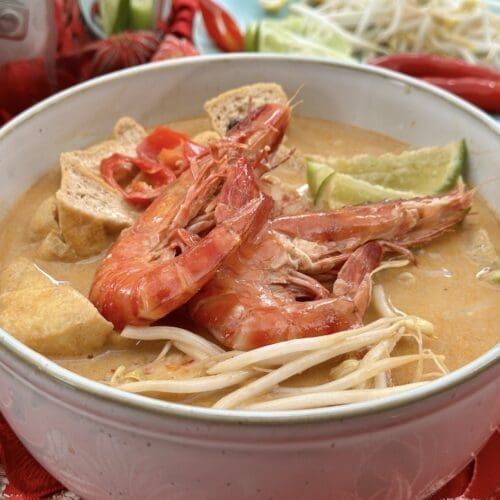
Easy Laksa Recipe with Prawns
If you're in the mood for laksa but don't want to spend hours cooking, this Easy Laksa Recipe is exactly what you need
Video
Ingredients
- 1kg / 2.2lb raw prawns (weighted with shell and heads intact) (NOTE 1)
- 2 tbsp (40ml / 1.4floz) vegetable oil
- 200g / 7oz laksa paste (NOTE 2)
- 6 cups (1.5L / 1.5qt) reduced salt/sodium chicken stock or broth
- 400ml / 13.5floz coconut milk (NOTE 3)
- 400ml / 13.5floz light coconut milk (NOTE 3)
- 150g / 5oz fried tofu puffs (NOTE 4)
- 2 tbsp (40ml / 1.4floz) fish sauce (NOTE 5)
- 3 tsp white sugar
- 1 tsp chicken powder (NOTE 6)
- 1 tbsp fresh lime juice
TO SERVE
- vermicelli noodles
- Hokkien noodles
- Bean sprouts
- Fresh chillies or chilli sauce
Instructions
- Optional, but highly recommended for delicious intense prawn broth. Peel and devein the prawns by removing the central vein or intestinal tract. Put the cleaned prawn meat in one bowl and use another for the head and shells.Heat a tablespoon of oil in a large saucepan over medium-high heat, then add the prawn heads and shells (not the prawn meat). Stir the shells regularly until they become bright orange, then pour in the chicken stock. Bring the stock to a boil, then lower the heat to medium-low and let it simmer for 10 minutes. Stain the broth, then discard the solids. You now have chicken prawn broth.
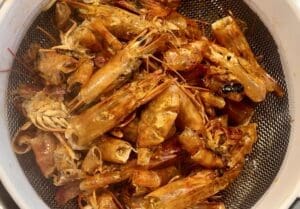
- Heat a tablespoon of oil over medium heat in a large saucepan (can use the same one, just give it a wipe over). Add in the laksa paste for 1-2 minutes and stir it quickly. Pour the chicken and prawn stock and bring to a boil. Reduce heat to medium-low, then stir in the coconut milks and bring to a simmer.
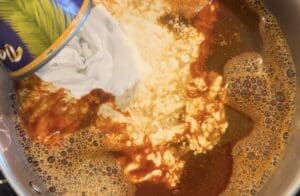
- Add the tofu, prawn meat, sugar, chicken powder, fish sauce and cook until the prawns are orange (1 to 2 minutes). Remove saucepan from heat, then stir in the lime juice. Have a taste and adjust broth to your liking by adding more fish sauce, sugar or lime juice to balance the laksa.
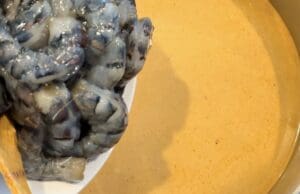
- Assemble the noodles in a bowl, then add some prawns, tofu and laksa broth. Optional - serve with fresh chillies or chilli sauce and bean sprouts.
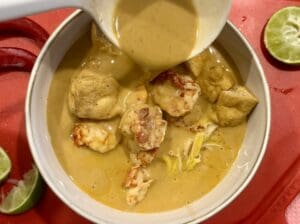
Notes
(NOTE 1) Raw prawns - To get that extra prawn flavour in the laksa broth, opt for fresh prawns with their heads and shells intact. The shells and heads have the most delicious prawn flavour, so we'll be using them to make the broth. For an even faster meal, simply use 500gm of pre-peeled prawns. If they're frozen, thaw them in the fridge the night before using.
(NOTE 2) Laksa paste - I've used Laska paste from Thailand and Malaysia and have enjoyed both, but they taste different. I used the Thai 'Por Kwan' laksa paste here, which you can find in Asian grocers. As with most store-bought curries, the quality, level of spiciness and sweetness in laksa paste can differ, so you might have to sample a few until you discover the perfect one for you.
(NOTE 3) Coconut milk - I used a combination of regular and light coconut milk to get that creamy balance in the laksa broth without making it too thick.
(NOTE 4) Fried tofu puffs (Tofu puffs or tofu squares) - These are prepackaged deep-fried cubes of tofu found in most Asian grocers in the chilled section. Tofu puffs have a sponge-like chewy texture that allows them to absorb flavours well, making them perfect in soups like laksa.
(NOTE 5) Fish sauce - My favourite brand is 'Squid fish sauce' from Thailand, but any brand of fish sauce would work. Despite its strong fish odour, fish sauce imparts a distinctive savoury taste to dishes. You should be able to pick up a bottle at the supermarket or at an Asian grocer.
(NOTE 6) Chicken powder - I cannot live without 'Knorr Chicken Powder' (not sponsored). It seriously enhances the taste in many of my savoury dishes. Although I highly recommend this brand, other chicken powder, chicken stock powder, or crumbled chicken bouillon cubes would also work.
Leftovers - Allow the laksa to cool completely at room temperature, then transfer into a sealed container (without the noodles) and store in the fridge for up to 3 days.
I've used a third-party application to calculate the calories and nutritional information, so please use this as an approximate guide only. This calculation excludes the noodles.
Cooking measurements are in Australian standard spoon and cup measurements. For specific details and conversions, visit our Australian Cooking Measurements page.
Nutrition
Serving: 1 ServingCalories: 394kcalCarbohydrates: 13gProtein: 20gFat: 29gSaturated Fat: 18gPolyunsaturated Fat: 5gMonounsaturated Fat: 4gTrans Fat: 0.05gCholesterol: 105mgSodium: 1192mgPotassium: 460mgFiber: 1gSugar: 5gVitamin A: 5402IUVitamin C: 4mgCalcium: 148mgIron: 4mg